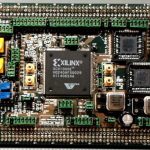Reconfigurable computing began with FPGA cards dropped into expansion slots in workstations. FPGA-based prototyping vendors tended away from that model as interconnect speeds rose and cabling complexity between modules increased. Much faster PCIe interfacing and bigger FPGAs mean revisiting the concept.… Read More
Tag: s2c
Fastest SoC time-to-success: emulators, or FPGA-based prototypes?
Hardware emulators and FPGA-based prototyping systems are descendants of the same ancestor. The Quickturn Systems Rapid Prototype Machine (RPM) introduced in May 1988 brought an array of Xilinx XC3090 FPGAs to emulate designs with hundreds of thousands of gates. From there, hardware emulators and FPGA-based prototyping … Read More
Should there be a 5-second IoT chip rule?
Kids have a tendency to put things in their mouths. Any parent can relate to the statement, “Put that down! You don’t know where it’s been!” After the first child, concern usually relaxes quite a bit. People joke about a 5-second rule on the premise if an object was just dropped on the floor, it may not be contaminated yet.… Read More
Breaking the Limits of SoC Prototyping
Earlier this month during my conversation with Dr. Walden C. Rhines, he emphasised the need for our next generation designers to think at system level and design everything keeping the system’s view in mind. The verification will go through major transformation at the system level. I can see the FPGA prototyping systems already… Read More
Pushing on AXI-connected IP in FPGAs
Success stories are great. Reading how someone uses a product contributes much more insight than reading about a product. Last month we had a teaser for a presentation by Wave Semiconductor; this month, we have the slides showing how they are using FPGA-based prototyping, AXI transactions, and DPI to speed up development.
First,… Read More
S2C ships UltraScale empowering SoFPGA
Most of the discussion around Xilinx UltraScale parts in FPGA-based prototyping modules has been on capacity, and that is certainly a key part of the story. Another use case is developing, one that may be even more important than simply packing a bigger design into a single part without partitioning. The real win with this technology… Read More
A Brief History of FPGA Prototyping
Verifying chip designs has always suffered from a two-pronged problem. The first problem is that actually building silicon is too expensive and too slow to use as a verification tool (when it happens, it is not a good thing and is called a “re-spin”). The second problem is that simulation is, and has always been, too slow.
When Xilinx… Read More
Taking prototyping beyond prototypes
Everyone has heard the expression, “Half the job is having the right tool.” In the case of FPGA-based prototyping, however, the right tool for the job is only the beginning. What teams really need to think through is what exactly should be done with an FPGA-based prototyping tool?
The obvious answer is prototyping an SoC, pre-silicon.… Read More
Conquering the Next IoT Challenges with FPGA-Based Prototyping
The need for ever-connected devices is skyrocketing. As I fiddle with my myriad of electronic devices that seem to power my life, I usually end up wishing that all of them could be interconnected and controlled through the Internet. The truth is, only a handful of my devices are able to fulfill that wish, but the need is there and developers… Read More
This is how FPGA Prototyping Works
FPGA prototyping has come a long way since the late 1980s when chipmakers began using FPGA devices for building system prototypes of ASIC designs. The utility of a working FPGA prototype allows hardware designers to develop and test their systems, and it provides software developers early access to a fully functioning hardware… Read More


